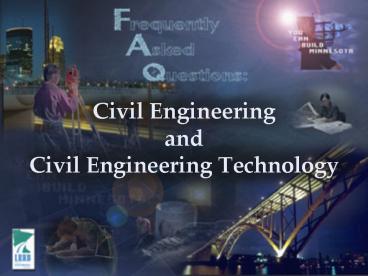Civil Engineering and Civil Engineering Technology - PowerPoint PPT Presentation
1 / 25
Title: Civil Engineering and Civil Engineering Technology
1
Civil Engineering and Civil Engineering
Technology
2
Why choose a career as a civil engineer or
technician?
From the pyramids of Egypt to the exploration of
space, civil engineers have always faced the
challenges of the future advancing civilization
and improving our quality of life.
- Civil engineers/technicians
- Solve problems,
- Improve quality of life,
- Serve their communities.
3
What is the job market like?
- Approximately half of all civil engineers will be
eligible to retire in the next 4 to 7 years. - A shortage of engineers could increase salaries!
4
What kind of person makes a good civil engineer?
- Someone who
- Is creative, with good problem solving skills,
- Understands math, science, computers and new
technology, - Communicates well,
- Understands business practices, finance, and
management.
5
How can I learn more about a career in civil
engineering?
- Talk to civil engineers and/or technicians about
their jobs, - Visit your local city or county engineer,
- Search the Internet for more information.
6
What can I do to prepare?
- Take science, math, and computer courses,
- Work on your communication skills,
- Maintain a B average,
- Speak to your guidance or career counselor for
more information.
7
Do I have to be good at math and science?
- Not necessarily but it helps.
- You may be better at figuring out solutions to
real-life problems than you are at solving
textbook problems.
8
What is the difference between an engineer and a
technician?
9
Engineering Technician
- Generally requires a 2-year associate degree
- Work includes
- CAD (Computer Aided Drafting),
- Preparing plans and construction documents,
- Surveying,
- Project scheduling,
- Managing and inspecting projects.
- Can involve spending a lot of time outdoors
10
Civil Engineer
- Requires a 4-year bachelors degree
- Work involves
- Developing new concepts and designs,
- Working with public and private partners,
- Managing projects.
11
How do I find a good school to get a civil
engineering technician degree?
- Check out a web site such as www.iseek.org to
locate information on programs available in
Minnesota. - Locally there are several schools offering
classes in civil engineering and surveying - Lake Superior College, Duluth
http//www.lsc.cc.mn.us/ - St. Cloud Technical College, St. Cloud
sctcweb.tec.mn.us - Minnesota State Community Technical College,
Detroit Lakes www.minnesota.edu/campuses/detroi
t_lakes/ - Chippewa Valley Technical College, Eau Claire, WI
www.cvtc.edu - North Dakota State College of Science, Wahpeton,
ND www.ndscs.edu - Southeast Technical Institute, Sioux Falls, SD
www.southeasttech.com
12
How do I find a school for civil engineering?
- There are many great local universities
- University of Minnesota-Twin Cities
www.ce.umn.edu - Minnesota State University - Mankato
www.mnsu.edu/ - University of WisconsinMadison
www.engr.wisc.edu - University of WisconsinPlatteville
www.uwplatt.edu/ce - Iowa State University, Ames www.cce.iastate.edu
- University of Iowa, Iowa City
www.cee.engineering.uiowa.edu - South Dakota State University, Brookings
www.sdstate.edu - North Dakota State University, Fargo
www.ndsu.edu - University of North Dakota, Grand Forks
www.und.edu
13
What can I do in college to prepare to be a civil
engineer?
- Gain experience through internships or summer
jobs, - Be active in student engineering associations,
- Talk to other civil engineers about the
profession.
14
Where would I work?
- The possibilities are endless
- Public Agencies,
- Private Companies,
- Military.
- Any location ranging from a large metropolitan
area to a small rural areaor even overseas!
15
What are the job prospects and pay?
- Job opportunities grow every year!
- Civil engineering graduates can expect to earn
between 40,000 and 50,000 per year. - Civil engineering technicians can expect to make
around 30,000 per year.
16
What are the various work areas in civil
engineering?
17
Construction
- You will turn designs into reality
- You will manage and build projects designed by
other engineers
18
Environmental
- Your work will help
- Provide safe drinking water,
- Clean up contaminated sites,
- Clean up and prevent air pollution,
- Treat wastewater,
- Manage solid wastes.
19
Geotechnical
- You will provide the knowledge and design the
foundations for much of what we need and use
buildings, highways, tunnels and bridges.
20
Structural
- You will ensure that structures are designed
safely and can withstand natural hazards. - These structures might include
- Stadiums,
- Skyscrapers,
- Bridges,
- Office buildings,
- Amusement park rides.
21
Transportation
- Your challenge will be to find ways to meet
increasing travel needs by improving existing
transportation methods and discovering new ones. - You will figure out ways to move people, goods
and materials safely and efficiently.
22
Urban Development
- You would be concerned with the full development
of a community and plan for the overall growth
and improvement of urban, suburban, and rural
areas.
23
Water Resources
- Your work will help supply water to cities, treat
wastewater, protect beaches and redirect rivers
to prevent floods. - You might design hydroelectric facilities,
canals, dams, pipelines, pumping stations, locks
or seaports.
24
Why become a city or county engineer?
- One of the greatest rewards of civil engineering
is the personal satisfaction derived from helping
make our communities better places in which to
work and live.
25
More questions ????
- Visit with your local city or county engineer.
- Find out how you can make a difference and help
build Minnesota!































